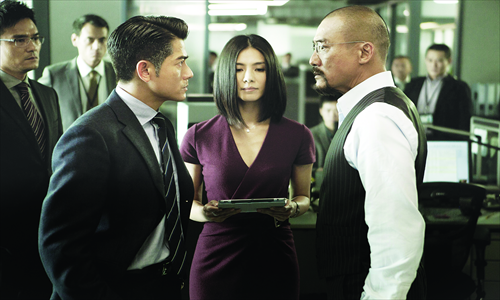'Cold War,' hot topic

The latest made-in-Hong Kong cop movie Cold War is definitely a black horse this November. With no famous director and lowkey marketing, the film looked like it would be pushed aside by strong competitors like The Bourne Identity, Taichi 2, Wreck-It Ralph and Skyfall (screened in Hong Kong).
Yet, it caught moviegoers' attention when it premiered on November 8 and raked in 15 million yuan ($2.14 million) in the mainland and HK$2.01 million ($235,900) in Hong Kong in its first day, surpassing all contenders including the latest James Bond installment Skyfall.
A movie of introspection
Although the film boasts an A-list cast, it was directed by a pair of unknowns, Longman Leung and Sunny Luk, neither of whom had helmed a feature film before. But they showed no timidity starting the frenetically paced picture with an explosion, a car chase, and a police van being hijacked - along with its five officers, one of whom is the vice commissioner's son. It all happens within minutes at a time when the head police commissioner is abroad promoting Hong Kong as the safest city in Asia.
Despite being labeled as a cop movie, Cold War contains much more than thrilling action scenes. It delves deep into the legal system of Hong Kong where blurred justice meets opaque politics.
There are inner struggles between the two vice commissioners, arguing over how to best handle the crisis (see above photo). And throughout the struggle, audiences can glimpse the directors' take on Hong Kong's laws and regulations.
According to movie critic Yu Xin, Cold War can be regarded as "an introspection of culture through the language of film in a highly legalized society." Yet, such an approach is not new in movies, and they often launch "political and philosophical discussions about the legal system in a free capitalist society," Yu wrote in his blog.
Yu used the example of the The Dark Knight Rises. "When [terrorist activities] break down the legal system the society relies on, crisis occurs… As local citizens are used by the terrorists, the whole power seizing crime is propagated as 'representing the common people's will.' At this time, Gotham City faces a constitutional crisis."
But different from Cold War, The Dark Knight Rises has Batman, a heroic figure that is above the law, which in Yu's analysis means the capitalist legal system is saved by something outside the law.
Fitting two markets
For a long time, Hong Kong crime dramas would have two versions, one for the local market and one for the mainland, with a different ending for each.
For example, in the Hong Kong version of Infernal Affairs (2002), one of the best works of this genre, Lau Kin-ming, a triad member who infiltrates the Hong Kong police department, escapes in the end. But in the mainland version, Lau is caught.
This is because, as many movie critics have noted, the mainstream ideas are different in the two regions. Most Hong Kong people believe that good and evil are intermingled, so they prefer to see figures with both characteristics. Mainland audiences, on the other hand, find it easier to accept an ending in which good triumphs over evil, and the lines that separate the two sides are distinct.
Also, with no rating system to restrain them, some of the violent and bloody scenes in crime thrillers are cut out before being screened in the mainland.
This dilemma has finally been resolved in recent years with works like The Viral Factor, Overheard 2, and now Cold War. Such films are being regarded as an example of how Hong Kong filmmakers are experienced enough to meet the demands of both markets.
The adjustments were made because, movie critic Li Zhong said, "many Hong Kong directors set the focus of their work on Beijing and have a better idea about how the mainland censors its movies."
The reality is that the mainland market is too important for Hong Kong movies, and therefore, Hong Kong filmmakers sometimes have to subjugate their personal ideas to the preferences of the mainland market.
Still not perfect
For many in the audience, however, Cold War still has its shortcomings, such as supporting figures that are not well-developed, and the conclusion seems too farfetched.
"The characters played by Chin Kar-lok, Lam Ka-tung and Terence Yin leave people dissatisfied," Li said. "If these rigid and flat characters could be made more lifelike and their interrelationships closer and more complete, this would be an amazing story."
Also, Li said he feels the surprise ending seems hard to accept, a sentiment shared by Yu Xin.
"The criminal's motive is too farfetched," Yu wrote in his blog. "To make so much trouble [for such a simple cause] is hardly the right thinking of a regular person."
An American audience member said that overall the movie is thrilling, but had this warning for the young directors: "It's great to see something so smart and crisp, but if the pace is beyond what your audience can catch up with, then you've lost them."
Yet, the cinematography is laudable. "The using of aerial shooting is new [in Hong Kong movies of this genre] and it makes Hong Kong look modern," Li commented. "It's a careful piece of work, with many innovative ideas in the shooting angles and explosion scenes."
"It's worth praising Longman Leung and Sunny Luk, who used to be assistant directors and art technicians, for doing such a good job on their first film," he added.